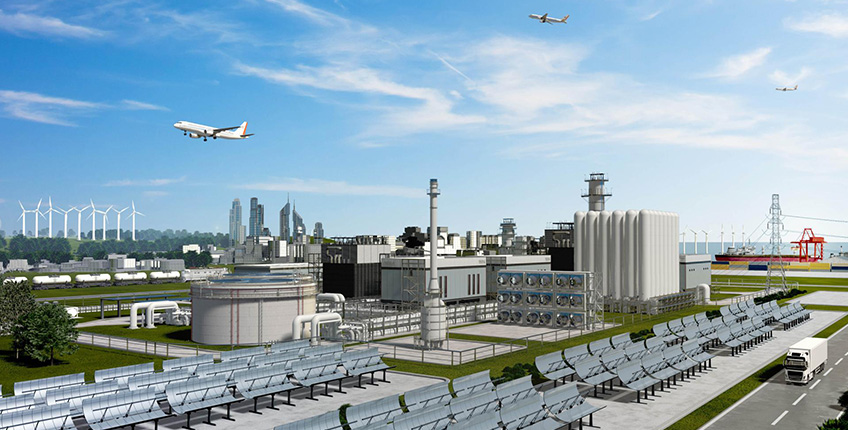Research and development of technologies for the production of power-based fuels on an industrial scale will be pursued at the Leuna research facility in the German state of Saxony-Anhalt. The Leuna Chemical Park (Chemiepark Leuna) was selected as the winning site in a multi-stage selection process. Electricity-based fuels are an important pillar for making mobility more climate and environmentally friendly, especially for aviation and shipping.
Following an extensive analysis, the German Aerospace Center (DLR – Deutsches Zentrum für Luft- und Raumfahrt) selected the Leuna Chemical Park in Saxony-Anhalt as the site for the Technology Platform PtL (TPP). The research facility is intended to make a decisive contribution to the timely production of electricity-based fuels – also known as power-to-liquid fuels (PtL) or e-SAFs (Sustainable Aviation Fuels) – on an industrial scale. To achieve this, DLR will work with companies and other research institutions to develop and test the necessary large-scale technologies and processes. Construction of the plant is scheduled to begin in January 2024, subject to final funding approval.
“The PtL technology platform will make a decisive contribution to developing technologies for the industrial production of electricity-based fuels and bringing them into use. We are therefore very pleased that we were successful in the selection process of the Federal Ministry for Digital and Transport. DLR will now concretise and expand the plans. Alongside alternative drives and further improvements in efficiency and usage, electricity-based fuels are an important pillar for climate and environmentally compatible mobility, especially for air and sea transport. Currently, e-SAFs are not yet available in sufficient quantities. With the TPP, we are meeting the challenge of increasing the efficiency of the energy sources, their climate compatibility and scaling them up for industrial production,” explains Prof. Dr.-Ing. Anke Kaysser-Pyzalla, Chair of the DLR Executive Board.
“E-fuel technology is poised for its market ramp-up. As a centre of innovation, Germany is committed to promoting and advancing the development of this technology. And this is where the support for the PtL technology platform comes in. As a lighthouse project, the platform will bring together companies and research institutions along the entire value chain to scale up and optimise e-fuel technology. I am delighted that an ideal location for implementation has now been found with the Leuna Chemical and Refinery Park,” says Dr Volker Wissing, Federal Minister for Digital and Transport.
“I am pleased that Leuna has been selected as the location for the PtL technology platform. This means that the German Aerospace Center will be represented by a second facility in Saxony-Anhalt, in addition to the Competence Centre for Unmanned Aerial Systems (Kompetenzzentrum für Unbemannte Luftfahrtsysteme) in Cochstedt. This demonstrates that Saxony-Anhalt is an excellent location for future-oriented research with its relevant players from industry and science. With this decision in favour of the Leuna site, the structural transformation in central Germany’s lignite mining region will be further accelerated. This project will make a significant contribution to the necessary development and future production of synthetic fuels,” explains Dr. Reiner Haseloff, Minister President of Saxony-Anhalt.
Investment in the upscaling of technologies for electricity-based fuels
As part of a competitive process, DLR was selected by the Federal Ministry for Digital and Transport (BMDV – Bundesministerium für Digitales und Verkehr) to plan the PtL technology platform in detail. The BMDV is providing around 12.7 million euros of funding support for this planning phase. Approval of the implementation phase, amounting to a mid-three-digit million euro sum, is expected to take place at the end of the year. Operation of the research facility is initially planned until 2035, and continued operation beyond that is envisioned. Approximately 100 jobs will be created in the areas of construction, plant operation and research.
Site selection via a multi-stage process
More than 60 locations were evaluated by DLR in the course of a multi-stage process. Three of these sites made it to the final round of selection. The infrastructure facilities on the site of the former Leunawerke in Leuna prevailed in this procedure. The owner and operator is InfraLeuna GmbH. “The Leuna site offers the best conditions for comprehensively implementing the research goals associated with the technology platform. Several factors tipped the scales in favour of the decision: the supply of renewable resources in the field of electricity and CO2, the technical infrastructure already in place, and the integration into the research landscape there with universities, colleges and non-university scientific institutions,” summarises the head of the project, Prof. Manfred Aigner of the DLR Institute of Combustion Technology (DLR-Institut für Verbrennungstechnik).
Largest research facility to date for industrial production of electricity-based fuels
The PtL technology platform will consist of two plant strands that build on each other: In the research strand of the facility, DLR will work with science and industry to test novel technologies and processes. Here, the researchers will conduct detailed scientific analyses and optimise individual components. Meanwhile, the demonstration strand will focus on the campaign operation of a semi-industrial plant for the production of electricity-based fuels with a capacity of up to 10,000 tonnes per year. This would make the TPP the world’s largest research facility in the field of electricity-based fuels, at present.
At the same time, the platform also spans across the entire process chain: The spectrum of topics ranges from renewable energies as a source for electricity-based fuels to the certification and demonstration of the use of these fuels. The project is based on the DLR’s comprehensive know-how covering the entire process chain and its many years of experience in these areas: from fuel design, i.e. the development of fuels with optimal properties and minimal impact on the climate and the environment, to techno-economic research and the development of production routes and the integration of electricity-based fuels into the entire energy system, to application and emission measurements, such as those carried out with the aid of special DLR research aircraft.
Fuel design: Targeted fuel development also reduces non-CO2 effects
Electricity-based fuels have the potential to not only save large amounts of CO2, but also to significantly reduce the so-called non-CO2 effects. These include the emission of nitrogen oxides, soot particles or water vapour. In aviation, the non-CO2 effects are currently about twice as high as the climate impact of the CO2 released. For example, soot particles and water vapour can cause condensation trails in the atmosphere, which create an additional warming effect. In this context, electricity-based fuels offer another important advantage: that of so-called fuel design. This means that the chemical composition of these fuels can be optimised so that, for example, it is possible to eliminate soot or particulate matter during the combustion process.
Image: DLR (CC BY-NC-ND 3.0)


